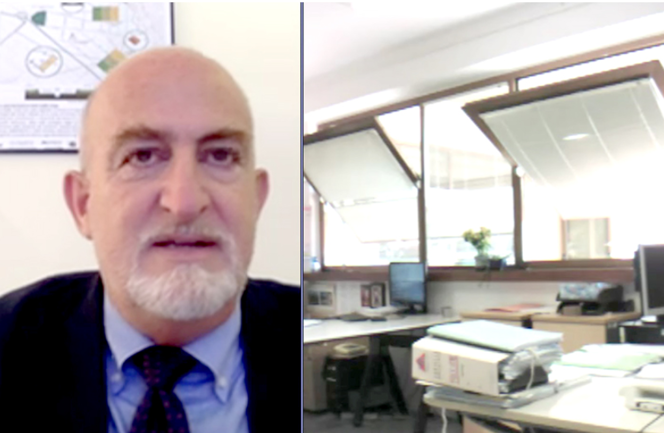NBS for the environment – benefits and opportunities

Design, implementation and monitoring of Nature-Based Solutions (NBS): Lessons learned and experiences from the EU project “Phusicos – According to nature”. These are the main topics addressed during the webinar “NBS: Green solutions for the environment. Benefits and opportunities” promoted and organized by the Basin Authority of the North Appenine District (Autorità di Bacino Distrettuale dell’Appennino Settentrionale).
This initiative, for its value, has been included into the national programme ‘All4Climate – Italy 2021’: which promotes and gathers initiatives, seminars and projects on the climate change, launched by the Italian Ministry of Ecological transition, together with “Connect4climate”, by the World Bank, and the participation of Lombardy Region and the municipality of Milano.
The webinar was held online on the 30th September with 157 registered contacts, and an average participation of 84 attendees. The scope of the webinar was to highlight how NBS, implemented within the Management and governance plans, support the delivery of ecosystem services while benefitting the biodiversity. The project PHUSICOS, financed by the EU research programme Horizon 2020, is aimed at demonstrating the effectiveness of NBS in mitigating the hydrometeorological risk, while preserving the environment and benefitting also the society. The ADBS represent the Italian partner with the case study of the Massaciuccoli lake and the Serchio river (province of Lucca, Tuscany), where NBS are being implemented to improve the water quality within the delicate water system and enhance the resilience to the effects of the climate change.
«It is a great satisfaction that the webinar today is among the events promoted by “All4Climate” in preparation to the COP 26, which will start the 31st of October in Glasgow (Scotland) – said Massimo Lucchesi – general secretary of the ADBS. As highlighted by the Italian Plans for the Ecological Transition (PTE), no countries can think to address the climate challenges alone, and Italy has a solid reference in the European dimension, which with The Green Deal has created an environment where to address the topic of the ecological transition, valorizing the peculiarities of each territory, and promoting the research and development by favouring the dissemination of the best practices. It is extremely important for this territory of the Basin district to promote activities related to the planning and the management of water and floods through the sperimentation of “non-traditional” and green measures.
Massimo Lucchesi – general secretary- ADBS
« The NBS implemented within the project PHUSICOS at the local scale at the lake Massaciuccoli, can be promoted at national scale as best practices of integrated management with NBS, and it represents already a concrete example of execution of strategic activities from the National Plan of Recovery and Resilience (PNRR), presented at the European Commission, and the national PTE – added Lucchesi -. In these plans it is highlighted, indeed, that is becoming more and more important to promote into the design process, interventions with nature and for nature and their adoption at large scale, for which more funding will be needed until 2030. This will be the future and we should work from today to prepare ourselves to this future and work together towards it: administrations, universities, start-ups, associations».
From the ADBS there has been also presentations from the Managers Marcello Brugioni, Isabella Bonamini and Serena Franceschini, who presented respectively the Plan for the hydrological disposition (Piano di Assetto Idrogeologico -PAI), the Plan for the water management (Piano di Gestione delle Acque -PGA) and the Plan for the flood risk management (Piano di Gestione Rischio Alluvioni – PGRA). Following, Vittoria Capobianco researcher at the Norwegian Geotechnical Institute (NGI) illustrated in detail the project “Phusicos – According to nature” and Nicola Del Seppia, from the office “special projects” of ADBS, presented the results of the Living Lab process, developed by the Technical University of Munich (TUM), for the stakeholders involvement. Nicola highlighted how the direct involvement of stakeholders (both public and private), has allowed them to build up a process of sharing and co-designing that helped them to identify a map with hotspots and critical areas, useful for the planning and the implementation of the NBS.
The NBS implemented at the lake Massaciuccoli are measures such as the buffer strips, vegetated areas realized along the channels of the crop fields to reduce the soil erosion and improve the water quality. The measures were realized by the ADBS, with direct involvement of the local farmers, and in collaboration with the Department of Agronomy and the Department of Earth Science of the University of Pisa, was established, and a direct involvement of the farmers. In addition, the start-up Nexman (http://www.nexman.it/) was responsible of the realization of an innovative monitoring system to be placed into the water channels in order to monitor water parameters, and verify the effectiveness of the buffer strips.
«We have started a systematic monitoring campaign based on frequent soil sampling and water (both surficial and underground) sampling – explained Monica Bini and Roberto Giannecchini, professors of the Department of Earth Science of the University of Pisa. This intense activity is based on the acquisition of field samples aimed at improving the knowledge of the soil and water situation of the system, necessary to identify the soil and water evolution and to develop forecasting models and risk management solutions to address the future climate change. Another scope of the monitoring is to measure the effects of NBS on the system».
«The challenge launched by the EU with the Green Deal (Europe becomes the first continent climate neutral before the 2050) requires also a re-assessment of the current farming and cultivation techniques– said Nicola Silvestri from the Department of Agronomy of the University of Pisa . In PHUSICOS we tested out different cultivation techniques (conservative farming, buffer strips along the farming fields) which can contribute to the mitigation of the effects of climate change (global scale) and to the resolution of specific problems of the lake Massaciuccoli (a scala locale). The results in terms of effectiveness of the measures help identifying the up-scaling of these techniques that favour sustainable cultivation within the district».
«The start-up Nexman was responsible of the design and realization of a continuous monitoring system of the chemical-physical parameters and determine their trends, and send the data to a cloud that allows the users a remote access to the data, with the possibility to download them when needed », explained Alberto Mannini, presale manager of Nexman. «Our company is devoted to innovation, but we are also attentive to the impact that our activity may have to the society– added Franco Giacomelli, technical director in Nexman -. For this reason we have accepted with great enthusiams the proposal from ADBS to use the innovation for the mitigation of the effects of climate change. The lake Massaciuccoli represents a unique natural ecosystem of international importance, and knowing that our technology will help the ADBS to monitor and improve the water quality of the system makes us very proud».
==========================================
This newspost was prepared by
Nicola Delseppia, ADBS, n.delseppia@appenninosettentrionale.it
==========================================

Massimo Lucchesi – general secretary- ADBS